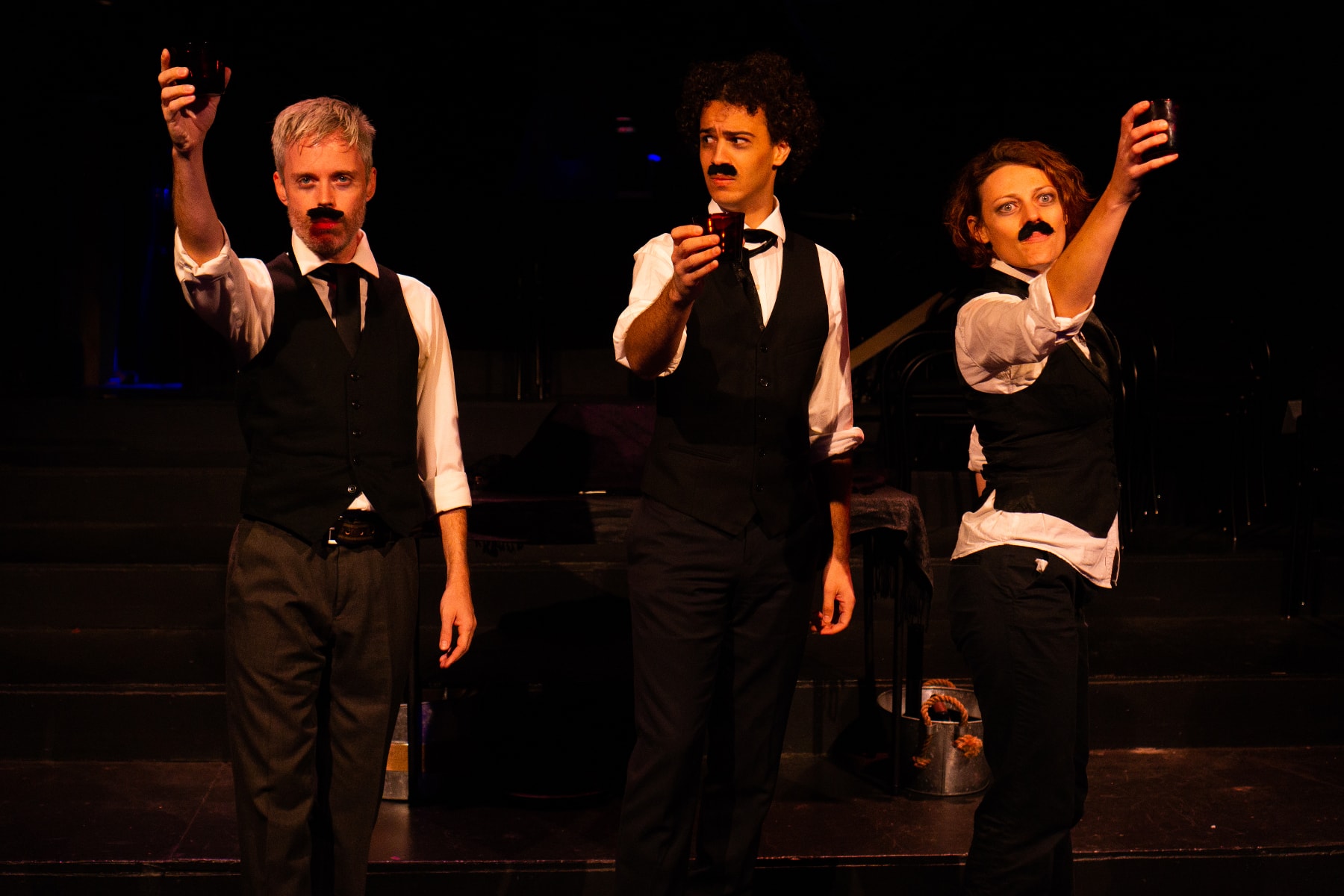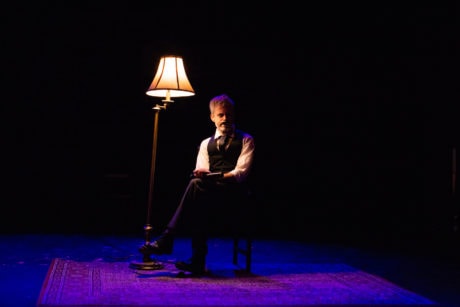Entering the black box theater space at the Capitol Hill Arts Workshop, it is clear that We Happy Few’s A Midnight Dreary is not a normal theatrical adaptation of classic literature. A simple paint job meant to evoke the mortar between stones in some dungeon somewhere is perhaps the most conventional aspect–the chairs are not arranged in rows but piled haphazardly in corners of the room, along with a handful of prop skulls and manual typewriters. In the tiered area where the chairs are normally placed, Alex Turner, dressed as Edgar Allan Poe with a glue-on mustache, sits alone, thoughtfully writing in a small journal. Meanwhile, his castmates, Kerry McGee and Jon Reynolds, similarly outfitted as Poe in black vests, trousers and ties with white collared shirts and mustaches, mingle – not in character, but as actors eager to speak of mixed drinks, mixtapes, and dramaturgy–if not erasing, at least smudging the line that divides artist and audience.

A Midnight Dreary is a devised piece, first performed in 2016 by McGee, Reynolds, the appropriately named composer Raven Bonniwell, and fellow company member Kiernan McGowan (currently playing King Harry in Faction of Fools’ production of Henry V) engagingly remixing Poe’s writings.
Turner looks up, and quotes from Poe’s correspondence to his publisher Evert Augustus Duyckinck: “I really believe that I have been mad — but indeed I have abundant reason to be so. I have made up my mind to a step which will preserve me, for the future, from at least the greater portion of the troubles which have beset me.” With that declaration, he produces a small vial of a green fluid, but before he can imbibe, the others stop him. Soon the trio are engaged in Bonniwell’s rousing musical setting of the poem “The Bells” with accompaniment on a child’s accordion – which will be reprised multiple times over the course of the next hour.
The audience is served cups of “Redrum Punch,” a cocktail specially crafted by McGee. A mixologist, she has concocted drinks for each of the three shows that We Happy Few are playing in repertory (the other two being adaptations of Frankenstein and Dracula). McGee’s mixology is dramaturgically informed – the ingredients are connected with each of the three Poe tales that We Happy Few have adapted. The first, “The Masque of the Red Death,” is a fantasy in which Prince Prospero gathers a thousand of his nobles in a fortified abbey as titular plague ravages the world beyond the walls. The notables revel without care, enjoying both the most sublime of the arts and debaucheries so transgressive that our narrator left them unnamed in the original 1842 text. Punch, of course, is the precursor to the modern mixed drink – a cocktail to serve the guests to a masquerade; the red of cranberry juice and cinnamon evoking the plague.
The supernatural tale is followed by two stories narrated by murderers (“redrum” is of course, “murder” spelled backward) and so McGee has mixed in two varieties of rum into the punch: gold and white.
“The Cask of Amontillado” is narrated by an aristocrat named Montresor (McGee) who entraps a rival wine tippler, Fortunato (Turner) with a promise of a taste of the aforementioned dark sherry, luring him deep into the labyrinthine catacombs beneath his palace to exact revenge on him for some perceived slight. In this staging, Director Bridget Grace Sheaff and the company have created a processional, in which the audience is brought along on the journey even winding through the narrow passage backstage before arriving at the place of Fortunato’s final entombment. When the victim’s fate is finally sealed, the audience realizes not only have they been made complicit by taking pleasure in Montresor’s confession, but also because they agreed to carry a brick mason’s trowel and a bottle of Médoc implements by which the plan was enacted. Finally, McGee’s Redrum Punch makes us complicit for the simple reason because it contains Amontillado from Montresor’s cask.
The final act is possibly Poe’s most renowned tale of a murderer, “The Tell-Tale Heart.” An unnamed killer (Reynolds) describes the ingenious manner in which he plotted the killing of an old man (McGee) with whom he lives (Poe never defines their relationship). In telling us of his plan, he wants to impress us with his intelligence, his cunning, and his heightened senses but never attempts to justify his actions — his only motive is the manner in which the old man’s filmy “vulture eye” fills him with dread. With a few changes of pronoun, Reynolds and McGee share the narration (allowing the old man to speak beyond the grave) as Reynolds ever so slowly brings the young man in for the kill. Meanwhile, Turner plays hauntingly atmospheric tones on the glass harmonica, before drumming the crescendo of the Old Man’s heart.

We Happy Few’s A Midnight Dreary may not include the poem from which its title is derived, but between Edgar Allan Poe’s synaesthetic use of language, the spirited performances of McGee, Reynolds, and Turner, and a range of immersive effects, including a drink pairing, audiences are in store for an intriguing hour of storytelling from an American master of weird fiction.
Running Time: Approximately one hour with no intermission.
A Midnight Dreary plays in repertory with Dracula and Frankenstein through November 10, 2018, at We Happy Few at Capitol Hill Arts Workshop – 545 7th Street SE, Washington, DC. For tickets, purchase at the venue or order online.




